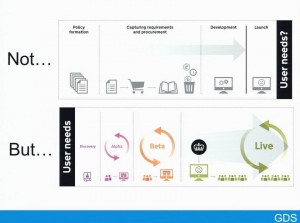The final day of the UCISA2013 Conference featured presentations by representatives from two Government offices with inspiring stories to tell of initiatives resulting in real efficiencies.
David Cotterill, currently Deputy Director, Strategic Change at the Cabinet Office spoke about his involvement in the Idea Street initiative – work undertaken during his previous role as Head of Innovation at the Department for Work and Pensions. Idea Street is “an online ideas-management platform that encourages employees to share their innovative ideas for change with a community of likeminded colleagues, and work with those colleagues to help make their ideas a reality”. Feedback from Timothy Knight, a member of DWP staff, “This project is amazing, as a front line member of staff who uses the platform it has given me the feeling of being valued, and listened to….”
Crowdsourcing innovation
David and the in-house innovation team (a mere seven in number) embarked on a quest to overcome three ingrained excuses for the lack of public sector innovation – no time, no resources, not the right culture. A new culture was developed and promoted at the DWP resulting in higher levels of staff engagement, changed behaviours and stimulated innovation. Idea Street uses a gaming approach with staff “day traders” playing the game, trading in virtual currency on the viability, or otherwise, of suggestions from colleagues, focusing benefits on actually getting ideas implemented. Developing a team to ‘Get Stuff Done’ is important as is a level of fun underpinning the activity. By harnessing social collaboration, and crowdsourcing innovation, the Idea Street received 1,800 ideas in 10 months; resulting in 174 successful ideas from which Cotterill is delighted to claim a, not insignificant, real saving to the Department of £20M. Final thoughts from David – “People like doing fun stuff. The unit of delivery is the team. Start with user needs.”
Digital by default
Mike Bracken, Executive Director of Digital at the Cabinet Office and creator of the Government Digital Service (GDS), is leading the ‘Digital by Default’ project and told the audience that the GDS builds services the way Google builds Google and Amazon builds Amazon – agile, iterative and user-focused. The GDS brought technologists into the heart of Government. He commented that it’s hard to change business models but it can be done – there are 672 transactions in government, but not many actually work digitally. These are being rapidly transformed, for example a simple process that does now work digitally and is particularly popular is road tax renewal. Steadily but surely, processes large and small are being digitised and moved into the easily-discoverable www.gov.uk site, replacing a myriad of separate and inconsistent department websites – ‘simple, clearer, faster’.
The way in which large organisations approach technology development projects is changing – the traditional project management cycle takes longer to complete than it does for an entire consumer generation of technology to change, leading to feedback at the end of a project that the solution (for example) “won’t work on my iPad” – because the iPad wasn’t invented when the process started!

Fail fast and move on
New agile methods use a “we fail fast and move on” approach. It’s about adopting and adapting; applying the kinds of technologies, approaches and capabilities that transform industries – or government – and that help incumbents transform their businesses to deal with new realities. Government has to deal with a considerable legacy, with many mandatory processes.
Some examples of the results of digitising processes:
- Making a lasting power of attorney – the online process has taken out 74% of the paper processing involved. Problems with scanning documents previously meant that staff were employed to re-write documents in longhand so that they could be better read by the scanner.
- Buying a tax disc – 5 clicks of the mouse, takes roughly 90 seconds. Used by 52% of those renewing. Interesting that of same demographic 74% insure their car online – so there is an argument that it needs to be better promoted.
- DEFRA annual process involving 105,000 farms in the UK – each farm has to complete documentation – process cost is £6M over a year, the new digital process (currently in alpha) cost is £250,000 over 8 weeks.
At the end of his presentation Mike asked a favour of the audience; the GDS is looking for a new breed of technologists, he’d be very interested in collaborating with people within universities and colleges.
Further links and background
- Session recordings are available at: http://ucisa.mediasite.com/mediasite/Catalog/Full/e3545ddc436d4398a36dbe6102811b9821 (you will need to register your email address)
- David Cotterill’s presentation is available on the UCISA website: http://www.ucisa.ac.uk/~/media/groups/acog/ucisa2013/presentations/UCISACrowdsource_%20Innovation%202 and this blog entry from Chris Sexton more fully explains the content, with links to videos etc – http://cicsdir.blogspot.co.uk/2011/09/crowdsourced-innovation.html
- Spark enables innovation in public service delivery. Spark brings in ideas from the front line of public sector service delivery, central government departments and innovations from outside the sector into a single innovation knowledge base for the sector – http://innovate-apps.direct.gov.uk/spark/spark-brochure.pdf
- Government Digital Strategy – http://publications.cabinetoffice.gov.uk/digital/
- Digital by Default – Martha Lane Fox – Directgov 2010 and beyond: Revolution Not Evolution https://www.gov.uk/government/news/digital-by-default-proposed-for-government-services
- Lord Colin Marshall’s work with BA “Putting people first” Harvard Business Review interview: http://hbr.org/1995/11/competing-on-customer-service-an-interview-with-british-airways-sir-colin-marshall/ar/1
- Tim O’Reilly: Work on stuff that matters – http://radar.oreilly.com/2009/01/work-on-stuff-that-matters-fir.html







